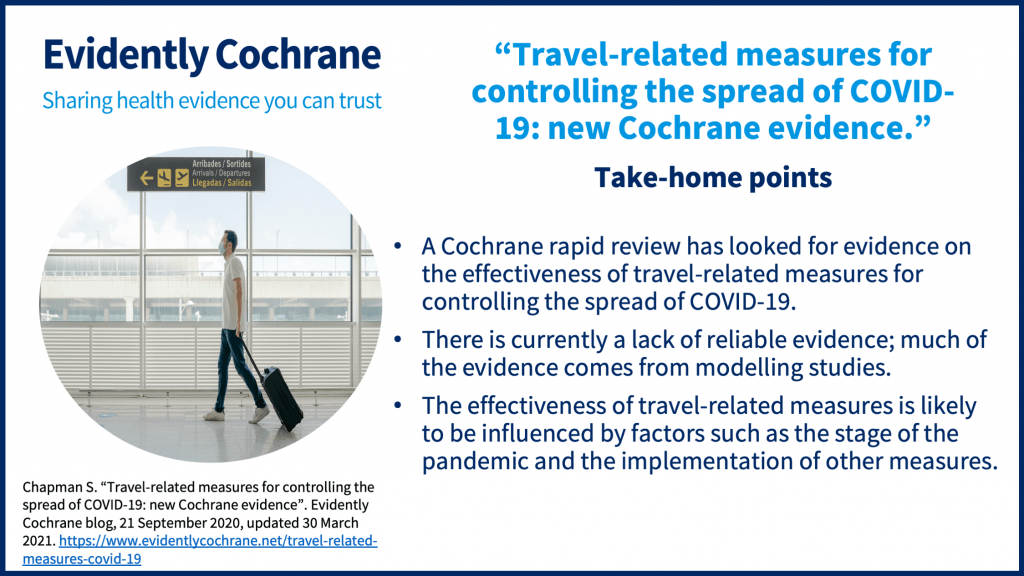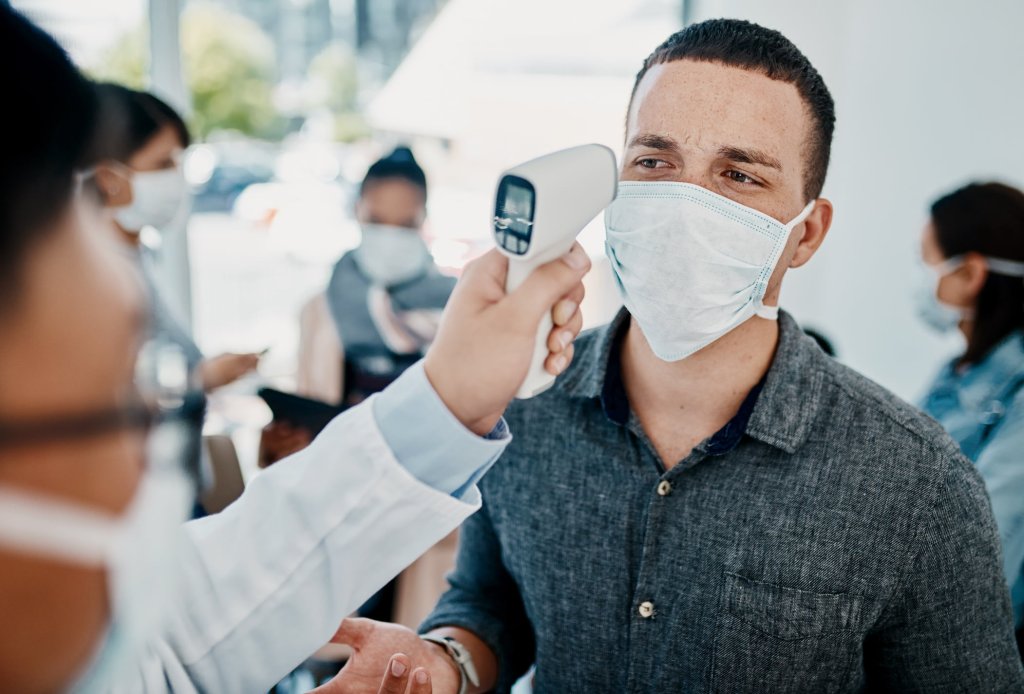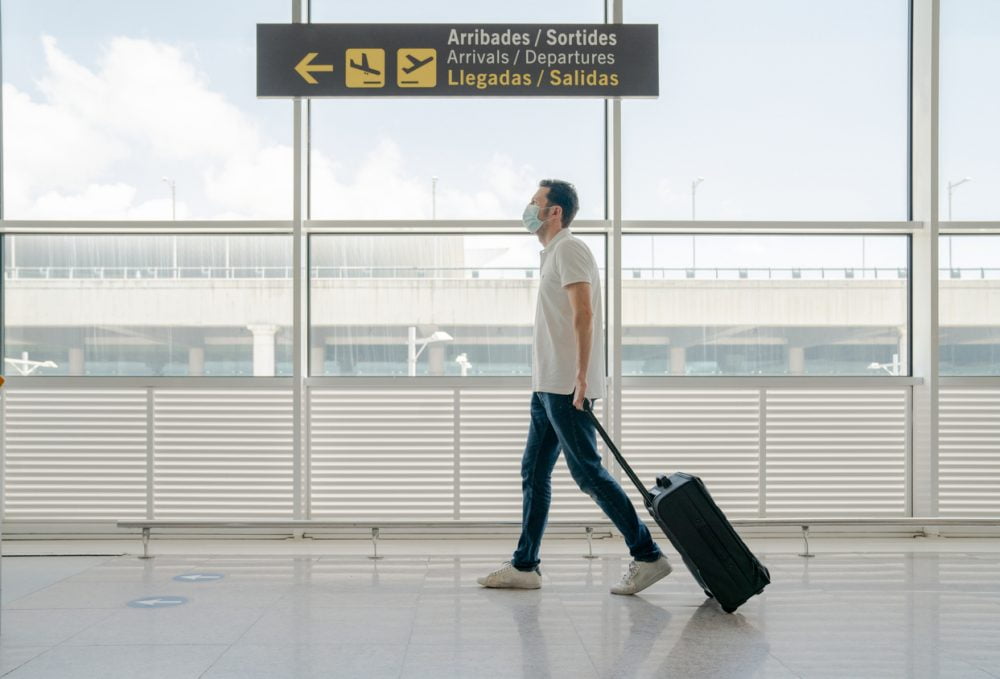In this blog, Sarah Chapman looks at a new Cochrane rapid reviewA rapid review is a simplified systematic review that can be done in a few weeks to produce timely evidence for decision-making. with evidence on the effectivenessThe ability of an intervention (for example a drug, surgery, or exercise) to produce a desired effect, such as reduce symptoms. of travel-related measures to contain the COVID-19 (coronavirus) pandemic.
This blog was updated on 30 March 2021 and last checked 26 June 2023.
Take-home points

Is anyone else wondering what we did before the pandemic? It’s all taking on a bit of a dream-like quality for me. One of the things many of us did was travel beyond our own borders. In the early weeks of lockdown, I binge-watched the two series of ‘Race Across The World’. Seeing people dashing about across the globe, mixing (mixing!) with other people, sitting in bars and on trains, already seemed extraordinary. Freedoms lost to us, for the time being anyway. I moved on to watching Simon Reeve explore Russia, with fewer people and a lot of snow and trees, a glimpse of the wide open spaces I was craving.
With the lifting of many restrictions in the summer, we emerged blinking into the sunlight, perhaps thinking of venturing beyond our home countries. But international travel, like so much else, is different now, and not just because we’re wearing face masks on trains and planes. Quarantine rules for travellers, subject to rapid change, have been frequently in the news. Of course there are other travel-related measures in place too, intended to help reduce the spread of COVID-19 or coronavirus, such as restrictions on travellers from specific countries and screening for symptoms that might indicate COVID-19 infection. But what do we know about the impact of these measures?

A need for evidence on travel-related measures to contain COVID-19 (coronavirus)
In response to an urgent need to understand their effectiveness, a Cochrane rapid review has searched for evidence on International travel -related control measures to contain the COVID-19 pandemic. This review is one of several simplified systematic reviewsIn systematic reviews we search for and summarize studies that answer a specific research question (e.g. is paracetamol effective and safe for treating back pain?). The studies are identified, assessed, and summarized by using a systematic and predefined approach. They inform recommendations for healthcare and research. that have been done quickly to produce timely evidence for decision-making during the pandemic. As well as studies on COVID-19, the review authors also looked for indirect evidence from studies of travel-related measures during outbreaks of severe acuteA health condition (or episodes of a health condition) that comes on quickly and is short-lived. respiratory syndrome (SARS) and SARS and Middle Middle East respiratory syndrome (MERS). The review includes 36 studies. 25 studies were on COVID-19, the rest on SARS and (one studyAn investigation of a healthcare problem. There are different types of studies used to answer research questions, for example randomised controlled trials or observational studies.) SARS and MERS. When review was updated in March 2021, studies on SARS and MERS were removed, to focus only on COVID-19. There are now 49 modelling studies and 13 observational studiesA study in which the researchers look at what happens over time to groups of people. They study changes or differences in one characteristic (e.g. whether or not people smoke) in relation to changes or differences in another characteristic (e.g. whether or not they get cancer)..
How reliable is the evidence?
The authors had a number of concerns about the studies. There is a lack of ‘real-life’ evidence, with much of the evidence coming from modelling studies. The studies varied in many respects, from the methods used to where they were carried out and the sort of measures they looked at. The review authors assessed the certainty of the evidenceThe certainty (or quality) of evidence is the extent to which we can be confident that what the research tells us about a particular treatment effect is likely to be accurate. Concerns about factors such as bias can reduce the certainty of the evidence. Evidence may be of high certainty; moderate certainty; low certainty or very-low certainty. Cochrane has adopted the GRADE approach (Grading of Recommendations Assessment, Development and Evaluation) for assessing certainty (or quality) of evidence. Find out more here: https://training.cochrane.org/grade-approach as low or very low, so the true effects of the travel-related measures investigated may be very different. The evidence thus far suggests trends rather than giving results in which we can have confidence.
Here’s what they found:
- Travel restrictions implemented at the beginning of an outbreak may limit the spread of disease across national borders (based on very low-certainty evidence from modelling studies).
- The effectiveness of quarantine of travellers as a single measure is uncertain.
- Screening travellers for symptoms on entry/exit is not likely to be effective on its own in detecting enough people with COVID-19 to reduce the spread of disease within a protected region.
- A combination of symptom screening followed by quarantine, observation and PCR testing is likely to be more effective.
The review authors also note that the contribution of travel-related measures in controlling the pandemic is likely to vary depending on the number and types of other measures that are put in place. In the video below, released with the first version of this review, lead author of the review Jacob Burns (Ludwig-Maximilians-University, Munich, Germany) talks about COVID-19 as a moving target. He had the following to say about the review update in March 2021:
“In this update we identified a much expanded evidence base related to international travel control measures to contain the COVID-19 pandemic, with 38 additional studies focusing on COVID-19 identified. Many of the studies were similar with regard to scope and methods, and overall the conclusions of the updated review remain largely the same. Some aspects of the evidence base, however, were improved – for example, we identified studies from further parts of the world that were not represented in the original review, including African and Eastern Mediterranean regions. Additionally, we identified more studies evaluating entry and/or exit screening measures at real-world ports of entry.”
We’ll be sure to update this blog again with future updates of the review. You can keep up with the evidence and related resources in this blog on Cochrane evidence on COVID-19: a round-up.
Reference:
Burns J, Movsisyan A, Stratil JM, Biallas RL, Coenen M, Emmert-Fees KMF, Geffert K, Hoffmann S, Horstick O, Laxy M, Klinger C, Kratzer S, Litwin T, Norris S, Pfadenhauer LM, Philipsborn P, Sell K, Stadelmaier J, Verboom B, Voss S, Wabnitz K, Rehfuess E. International travel‐related control measures to contain the COVID‐19 pandemic: a rapid review. Cochrane Database of Systematic Reviews 2021, Issue 3. Art. No.: CD013717. DOI: 10.1002/14651858.CD013717.pub2
https://www.cochranelibrary.com/cdsr/doi/10.1002/14651858.CD013717.pub2/full
Related World Health Organization guidance:
World Health Organization. “Public health considerations while resuming international travel.” World Health Organization, 30 July 2020. Web. 16 September 2020. https://www.who.int/news-room/articles-detail/public-health-considerations-while-resuming-international-travel


